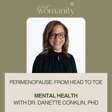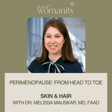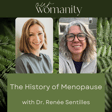Become a Creator today!Start creating today - Share your story with the world!
Start for free
00:00:00
00:00:01

11. Perimenopause: Facial Plastic Surgery with Dr. Diana Ponsky
This episode features Dr. Diana Ponsky, a renowned facial plastic surgeon in Cleveland, Ohio, who leads Ponsky Facial Plastic Surgery. Double board-certified in Facial Plastic Surgery and ENT, Dr. Ponsky specializes in natural facial rejuvenation. She discusses how hormonal shifts impact the face and what women can do about it.
The Hormonal Impact on Aging
Dr. Ponsky notes that a sharp drop in hormones around menopause can feel like an "acute switch" in aging.
- Collagen Loss: Women can lose up to 30% of their collagen within five years around menopause, followed by a 2% loss each year.
- Structural Changes: Low estrogen affects receptors throughout the skin and bone. This causes skin to become coarser, fat to descend, and even facial bones (like the jaw and areas around the nose) to atrophy, which can flatten the brow arch.
Prevention and Maintenance: The "Car Tune-Up"
Aging gracefully is about slowing down the process, which Dr. Ponsky compares to constant maintenance on a car.
- Proactive Care: Genetic predispositions mean some women benefit from early surgical prevention (like brow lifts or fat transfer).
- Lifestyle: Rigorous skincare, sun protection, and avoiding repetitive motions (like drinking through straws) are crucial for maintenance.
- The Role of HRT: Dr. Ponsky is a firm believer in Hormone Replacement Therapy (HRT), even starting in perimenopause, to slow the loss of muscle mass and bone density (including in the face).
Treatment Options
- Fillers: These are volumizing agents (like hyaluronic acid) that replace lost volume; they do not lift. Dr. Ponsky cautions against overuse, as too much filler can distort muscle movement.
- Never Too Late: For those who missed the prevention window, aggressive treatments like deeper lasers and fat transfer can still yield great results, combined with a commitment to nutrition and a long-term care program.
Dr. Ponsky reminds women that given we are living longer, tending to our bodies is necessary. It's not vanity; it's ensuring a high quality of life long after menopause.
Transcript
Introduction to Aging and Appearance Changes
00:00:01
Speaker
Have you ever looked at an old photo, maybe even just from five years ago, and noticed that you looked a little different? You have fewer fine lines around your eyes. You have less definition around your smile. Those marionette lines that people call them weren't there at that time. Have you ever thought, oh my gosh, things have changed and more quickly than I expected. Is this menopause?
00:00:26
Speaker
Is this a change of aging? What exactly is going on?
Meet Dr. Diana Ponsky, Expert on Aging and Menopause
00:00:30
Speaker
Today i have Dr. Diana Ponsky to talk about all of this with us. She's a renowned facial plastic surgeon in Cleveland, Ohio, double board certified by the American Board of Facial Plastic Reconstructive Surgery and the American Board of ENT.
00:00:42
Speaker
She's the former director of the Division of Facial Plastic and Reconstructive Surgery at University Hospitals Cleveland Medical Center. She's an assistant professor at Case Western Reserve University ENT, otolaryngology, and plastic surgery. She is a wonderful individual, and I'm so excited for you to hear from her today. Welcome, everyone. As you just heard, my guest today is Dr. Diana Ponsky, and you heard her incredible credentials already. So as a facial plastic surgeon, wanted to wanted to have Dr. Ponsky on today to ask her about where she sees perimenopause and menopause showing up in her field of
The Role of Estrogen in Aging
00:01:18
Speaker
work.
00:01:18
Speaker
As we've talked before, we have estrogen receptors in our entire body, and i know that she sees it in her work. So I wanted her to share with you all what she sees. So thanks so much for being here, Dr. Ponsky.
00:01:30
Speaker
so happy to have your time and so lucky to have your time. for all of our listeners Thanks so much, Rachel. I am honored to be here. And I think our, you know, collective conversations can help some of our patients learn a little bit more about their process of aging and their perimenopausal and menopausal journey. In my practice, it's interesting. think take a lot of photos so over the years. And i will follow patients for like eight years
Detecting Menopause Through Skin Changes
00:01:55
Speaker
at a time. And it's really interesting that I can pinpoint the exact time when I think like they've hit menopause, because there are certain changes that you can see And the patients will tell me, they will say, gosh, my skin's coarser, like no matter what I do, just really doesn't improve. I've got all these brown spots, you know, things like to wipe the corner of my mouth because things feel like they're, you know, dragging down. And it's through my patients that I'm, you know, learning these things that we do things to slow down the process. I love that.
00:02:27
Speaker
Well, I'm a big believer in preventive medicine, and I think preventive surgery also has a place. But I would love to hear more about what things you're noticing, because I know for myself, I can look at my hospital badge from five years ago and I'm like, oh, gosh. Things change.
00:02:42
Speaker
I had a baby. I went through postpartum period. And, you know, now I'm entering perimenopause and I can see some changes, but I think your eye is so much more tuned. You've got this expert eye to see those changes. What are you seeing specifically?
00:02:58
Speaker
Yeah, yeah. So it's not just me, actually. It's the fact that we have iPhones, right? And now we're more heavily studied. Everybody's more tuned to their faces because they've studied their photos over the years. yeah Classically, we knew how the body changed in the yeah you know Middle Ages and all that. But now we can actually study and pinpoint faces. Usual things, our skin gets laxer, we lose facial volume, our jawbone down here gets shorter and becomes much more square, or we call it masculine.
00:03:27
Speaker
Our brows no longer, if you look at pictures of older women, we lose our arches over time. So that hot nice, you know, arch becomes more masculine. Yes. Over time, it's flatter. Okay.
Facial Changes Due to Aging
00:03:39
Speaker
So, so there are my eyebrows. Okay. There are minor things. And then there are things that are more noticeable. And I think it's harder to see in yourself. But if you look at pictures of women for decades, you'll notice it. It's all a descent, gravitational skin descent, fat descent, and an atrophy of certain fat groups in the face and how they gravitate downwards.
00:04:03
Speaker
Oh my gosh. Okay. And so that's why people do all these things to lift, right? Like the facelift. That's like the that' only thing I know as a gynecologist. And so that's why I wanted to have you on here to tell us more. I know it's more than just a facelift.
00:04:14
Speaker
Sure,
Ongoing Maintenance vs. Major Procedures
00:04:15
Speaker
sure. So not just lifting, like the lifting, you can get the... Skin, right? You can shrink up the skin size because it expands as we get older. Then you can do the lifting and cut off excess skin. Doing that, you also lift muscle groups, right? And then you can also reposition certain fat. But it's not just a one thing. It's gradual, just like we exercise daily to tone our muscles and to keep it as healthy as it can be. That's why we do resistant exercises and stuff like that. So you can't just say, okay, at 60, I'm going to do a facelift and then I'm done for, you know, whatever.
00:04:51
Speaker
It's a constant conditioning, basically, of all components. And I think that's the part that we're just starting to realize that it's just not one thing, just like you don't fix your car once and that's it. You have to tune it up. Yeah. Do little maintenance checks throughout I love that analogy. I mean, I've done some of my own preventive work.
00:05:08
Speaker
I've told you, or maybe I've told you a while ago, wanted to do a blepharoplasty because I look at my family members. They're all gorgeous, but I see that what's coming down the road for me. You're seeing older family members. i'm like, it's just genetics, right? I wanted to have a blepharoplasty after watching a show and seeing, okay, that's what I need to do to prevent this eye sagging. And then I talked to a facial plastic surgeon who told me actually to do a lift, like a brow. lift. Right. And then they put fat underneath my eyes so that i wouldn't look like I always have bags under my eyes. And I thought that was really helpful as a big preventive move. But you're absolutely right. The maintenance after that, you've like, you still need to do more than just know one thing. So I'm assuming it's not one size fits all that every patient is different, but how would someone go about thinking through like, what's the big preventive thing? And then what's the maintenance that they should be thinking about? Sure.
Unique Aging Processes: Genetics and Health
00:06:00
Speaker
So I think, know, you honed in on the important part where like you saw yourself, you saw your family members who are older than yourself, and you can tell that you're related to them. So you're going to go through a similar journey. And so that's very important. And doing it earlier will give you many more years of it lasting. right so the part where not everybody has the same gray or the same journey in aging is the most important thing so you are correct some people just have an upper eyelid lift but some people whose brows have fallen prematurely because of frowning of concern of you know just genetics that may be the better surgery for them and so you you do want someone who's an expert in the face to help you with that query or that question it's And for me, like I have had things done too. So in my family, it's upper eyelid skin. And then genetically, as an Asian, I do know that I'm going to get puffier my under eye areas, I get older. So unlike you, who had some hollowing, I'm going to need fat taken out, you know, in the future. And so we're all very individual. And ethnically, that all plays a role too. In terms of, let's say, maintenance, right? For me, it's about the skincare. It's about staying away from the sun so I don't get brown spots. I know that genetically I'm going to get more evenness of skin tone because of my Asian background. So I will do things to pre prevent it. I'll use sunblock every day. I'll use creams that will make my skin health the best it can be. i will also make sure that I will do laser treatments and chemical peels.
00:07:32
Speaker
Much more than others, because I know that's coming down the road for me. You know, with menopause, like we know that within five years, 30% of our collagens deplete.
Impact of Collagen Loss at Menopause
00:07:42
Speaker
Oh my gosh. Yes. In the five years around, yes, menopause, 30% of our collagen will deplete. And then 2% each year thereafter. And so that's why it's like, it's almost like a switch that you like one day notice, oh my gosh, my skin is not the same, you know, glowy skin that it used to be and things are sagging. So it's just about prevention and what's coming down the road. That's so interesting. Interesting. And so some of that prevention is not necessarily surgical. like Some of it is, right? There's some structural changes that however much skin cream you can try is not going to stop the sagging of my eyes, right? So some of that is surgical and then some of it sounds like sort of skincare. And then i wonder what you think about the role of hormones for people. Yeah, so I'm a big believer in it because we both know that, you know, we can't completely prevent things, but we can slow it down. So I like to explain to to my patient if I had an identical twin and I didn't do all the things, good skin care, good sunblock, all that, and my twin did, we would look like 10 years different after a certain number of of time had passed. And we know this because we've done twin studies over the years where certain lifestyle habits, smoking, drinking, you know, sun exposure, all that make a difference. So to your question of hormones, I think we know that there are estrogen receptors throughout our body, especially in our skin. And so those receptors, I don't actually know if they change. You'll know more about that. But I know that the circulating estrogen, that changes, right? And so that's how you'll see skin changes, mucosal changes, hair changes, things like that. And being able to start hormone replacement therapy earlier is a game changer.
Hormone Replacement Therapy and Aging
00:09:22
Speaker
I think, you know, for myself, I've consulted with you to get on hormone replacement therapy even before I'm at menopausal times. And so that's just to make sure that I stay on top of my muscle mass, my fat redistribution goes from our face to our mid part. And so I'm
00:09:39
Speaker
right It's true. That's true. And I love that you're mentioning starting earlier rather than later, because again, if we're talking about prevention, we're talking about doing things to slow down. so you know, aging is inevitable. we all want to age gracefully. And I think what gracefully means is like slay. slower, right?
00:09:57
Speaker
And less of that acute switch. I love this that you say that you see this switch happen in people, because I think that's got to be that depletion of the collagen, the depletion of estrogen, and maybe the depletion of testosterone too. And if we can slow it all down through medication and treatment, then that would be a good thing. I would think then your body's not going through such a huge change too. Right. Like, I guess if you're losing a lot of muscle quickly, it's going to be more visible everywhere else other than a slow, gradual loss.
00:10:26
Speaker
No, for sure. And it starts with educating. And I think, you know, we're at a great time in our society right now where science is advancing rapidly. And the things that we're learning include different silos, like we're collaborative rather than in our little individual silos. And so I learned a lot from you. And I think, you know, because we see the human body reflect all these like hormonal fluctuations and differences everywhere, muscle mass, bone density, all of that.
00:10:54
Speaker
so And you mentioned smoking. i mean, I see the difference in smoking for my patients. And if I'm going to do a reconstructive like vaginal surgery for someone, I do tell them I'm not going to operate unless you've quit smoking for six weeks before surgery and at least a month after, because otherwise it's not going to heal. You've see those changes in smoking in the face too? Yes, definitely. Luckily for me, I think smoking is becoming less of an entity, mainly because of lip lines, right? People see their lip lines and yeah they know that smoking contributes to its exacerbation, but so does using straws and things like that. From a healing standpoint, the face... I
Lifestyle Factors: Smoking and Aging
00:11:32
Speaker
never thought about straws.
00:11:34
Speaker
ah Not only are they not environmentally friendly, but they're a hazard for your face it's repeated motions of anything so so all those Stanley cups that's I know interesting tidbit there yes so for sure it is lifestyle you know things that contribute and I have the same parameters mine's a little bit more lenient I do four weeks before four weeks after but essentially it's the same and it's because we want the best healing processes for the patient. And these are important things. Your vaginal reconstruction, it's like hard to do it a second time. And so you definitely want to enable your patients to have the best recovery possible. Tell me about all of the things that women should be thinking of if, okay, say they missed out on the prevention, maybe they can't use hormones, or maybe they're just now coming to a point in their life where they've got time and resources for themselves. And And, you know, they see that the aging has already shown up. They see the hormonal changes are already there. What can they do? Is it too late for them?
00:12:35
Speaker
It's never too late. Right. Because right now we're living to what, one hundred and five, one hundred something. And so in the next few years, it may be one hundred and twenty. And so I always say it's never too late to get started. Honestly, there are other ways around it. You may need somewhat of a more aggressive treatment. So let's say you've been a sun worshiper all these years because you just didn't know. And now you're like, I want to take care of my skin, get my wrinkles and dark spots better.
00:13:00
Speaker
It would be a little bit more of an intense therapy. We might... Have bigger, you know, more deeper lasers applied to them and then get them on a skincare program. We might talk about fat transfer to combat fat and muscle so atrophy and then also get you on a maintenance program. So it just means there are more things that, you know, that we might have to do in the initial get go.
00:13:20
Speaker
But if they're committed to a care program and maintenance and, you know, care of their facial skin program, that really helps. And it comes with also nutrition. It's not just like this and all the creams in the world will help you, but you're still not eating healthily or right and exercising. Everything is tied in together. so Can you tell us, maybe this is just my own selfish question, what is the role for fillers? Because I've never quite understood like when people should be using fillers or looking for them.
Understanding Fillers in Aesthetic Treatments
00:13:48
Speaker
So that's a great question. Fillers are a volumizing agent that is sensitive.
00:13:53
Speaker
Aesthetically created to mimic what our own body makes. So hyaluronic acid is the most common one, but there are other types of fillers and they volumize. They don't lift. And it's somewhere along the way, the distortion happened, whether it's through you know advertising or what. But if you volumize enough, yes, you can give the illusion that you're lifting, right? So ah if I'm putting fillers in my cheeks and I blow it up enough,
00:14:21
Speaker
Then it seems like it's lifting the other tissues, but it's not. And so it will plump up something that is coming more deflated. And don't get me wrong. on I think there's great role for fillers in certain areas. It's just that I feel currently it's used too much. It's being used.
00:14:38
Speaker
not always in the right way. And we we are learning that the product does a little bit more than what we knew in the beginning, which is that it stays around, infiltrates into muscles. It can sometimes, let's say for the mid cheek, it can distort the ability of that muscle to fully function. So the smiles are off because this is like so full. You can't move them. Is that what you're saying? Exactly. It's infiltrating into those muscle fibers. And so it's not allowing adequate room for movement.
00:15:08
Speaker
Okay. That's so interesting. And I think that's why you're so special, honestly. Like you have this ENT and plastics training. So you understand the musculature as well as like the surface. That's at least how I think of you. Oh, thank you for that. I mean, that's really important. And I've noticed the differences even of just having Botox on my forehead from someone who has training like yours compared to like going to a med spa. I feel like it's completely different. And I think, well, you can see my Botox is wearing off, but... You know, like I think when somebody understands the musculature, just done differently. I think it makes more sense to have someone with expertise like you to take care of a person's face.
00:15:46
Speaker
you know you know I appreciate that. Those words the training, you got to put it into some use, right? Absolutely. Absolutely. okay So what about nutrition? And, you know, we talked about lifestyle and like that.
00:15:57
Speaker
Do you see a role for things like collagen or these other supplements? I know we've done some social media videos because you see these things being added to like drinks and beverages and like everybody wants to sell something with an added supplement
Collagen Supplements and Dietary Effects
00:16:11
Speaker
these days. Is there a role for making supplemental collagen do you see or what do you think about that stuff? So there's a role for health and natural foods giving you the supplements that you need. yeah Collagen is essentially created by all fibroblasts, right? And if you imbibe, if you drink, if you take collagen, that doesn't mean that it's being created in your body the same way.
00:16:36
Speaker
Now, can you pull nutrients from these supplements? Because it's not just the collagen, right? It's probably some components of the building block. Yes, it may help you. But i it's not it's not proven direct correlation or direct science. they replace ah Exactly. It's sort of like when you build a car, right? Just because you throw extra tires at it doesn't mean that it's going to make itself into a car with four wheels. It's just a building block of what you need to make oxygengen So i don't know that all the science is there to support their claims. I don't see it doing major harm, except for some of those IV infusions. We got to be careful of those IV infusions that have peptides and growth factors and things to make sure that they're compatible with your system. But, you know, collagen that you drink, collagen pills that you take, I don't see as harmful. So if it helps you get some building blocks, sure, but it's not going to automatically translate to collagen for your system.
00:17:34
Speaker
Right away. That makes sense. And then, of course, sunscreen, another good preventive for everybody. yeah And then what would you suggest for people? you You mentioned like kind of different ethnicity, different backgrounds. I think that's really interesting. How could people figure out what makes sense for them individually?
00:17:50
Speaker
Right. So aging is very individual as well as very genetically
Genetic and Ethnic Influences on Aging
00:17:56
Speaker
based. And so if you see, you know, what your parents are going through, so I can tell you what's in my future, you know, based on looking at my mom and dad and my aunt and all that.
00:18:06
Speaker
And also the Asian race where like the chubby cheeks become more of an entity in the short jaws. You just have to kind of pay attention, I guess. But also because we've studied did it, I can tell you that someone who is blonde, blue-eyed will age faster from a skin standpoint, but their bony health would be better than lesion. For instance, we talk about osteoporosis, right, in the long bones. But osteoporosis also happens in the facial bones. So the jaw bones, around the nose, certain things. Yeah.
00:18:35
Speaker
If you take my heritage, I can tell you that my jaw, my chin is going to recede faster because the bony changes than my soft tissue.
00:18:45
Speaker
Whereas if I take a friend who's blonde, blue-eyed, I can tell you that her skin's going to need a lot more work to combat the aging because she'll develop lines faster, even if she's the best at wearing sunscreen herself. So the lines etch in more, skin ages faster, but yet her cheekbones and her jawbone will withstand time faster than mine will.
00:19:05
Speaker
That's so interesting. And that's another, honestly, sorry, not to just talk about hormones again, but it's another role for hormones. If you can take estrogen, that's going to help prevent osteoporosis. And like you said, we are living longer than ever before. So we're living...
00:19:18
Speaker
After menopause, after we have estrogen circulating for longer than ever before, some of the you know statistics I've 30 to 40% of our life now is being spent so after menopause. And so you think about that as a time where you don't have circulating estrogen and we start to lose our bone density, yeah right? Then like we're only in a lost state. Wow. I had never thought about the small bones of the face. That's so interesting.
00:19:43
Speaker
That speaks to, you know, learning about your hormone stores and getting on them earlier. exactly. My last question for you, if you don't mind, unless there's something else. But was thinking, you know, what about people who are listening to this and say, like, we shouldn't try to put off aging. This is a natural part of life. Like, let's just go with it. I mean, I try really hard not to be an ageist. I think that's also important. But i feel like I don't want to give the perception that we all are trying to get to this fountain of youth.
00:20:13
Speaker
because So how do you reconcile those two things? are yeah It's a tough question. And I think it boils down to your philosophy on how you want to approach
Dr. Ponsky's Aging Philosophy: Maintenance and Proactivity
00:20:22
Speaker
it. And I hear you. I hear that all the time, too. I'm just going to age gracefully. But it means different things for different you know people, right? I know that in my future, i'll I'll bring it back to the things that I do to keep my physical health, not just as it pertains to what I do in the face, yeah but like For instance, I mentioned that I take hormone placement patches, pills. I'm doing prevention for my hair because I know that's coming down the road. And so I take a subtherapeutic minoxidil pill to curb the hair loss that I know I'm going to start to see. i also eat very healthy. i walk a lot and I try to exercise more regularly on resistance training.
00:20:59
Speaker
But on that same line, I'll do PT for my lower vaginal portion because, you know, I have three kids. They were all vaginally delivered. I know my pelvic floor is going to stretch and not be as healthy as it can be. And so these are things that like I i know is headed down the road because mainly because i I see it in our patients, right? Their complaints, their worries.
00:21:22
Speaker
And so I want to do everything to make sure that I can help myself along the journey until something happens. Like, God forbid I fall and break a bone. The fact that I have better muscle girth is going to help me recover faster.
00:21:36
Speaker
And so it's all those things that will like propel you. Like if you had a car and you didn't take care of it, your maintenance is going to be longer. It'll be more drastic and there'll be rust and things like that. Whereas if you took care of it along the way,
00:21:49
Speaker
It is eventually going to fall apart, but hopefully the repairs will be less intense. The same reason you take care of your house, right? You're not going to let it it go naturally to a state of, you know, decrepitness. You're going to make sure that the leaves don't collect in certain areas and wear things down. And that's my approach to it. I feel like everyone's different. You can just leave things alone, but your body just still needs tending to just like everything else. You buy different clothes. You don't wear the same clothes you've had through, you know, like Since your 30s, I mean, some people may, but like you usually want to renew things and to you know ah take care of yourself in that way. And so I think this is just a natural translation of it. It's not vain. It's just we are living longer.
00:22:31
Speaker
And so we've got to keep our bodies working for us longer. So yeah. I love that. Well, thank you so much for your time. i learned a lot of interesting things today and sure that our listeners did too. And really appreciate all of your words of wisdom and your advice. And definitely if you're in the Cleveland area, I would encourage you to make an appointment with Dr. Ponsky and get your own individualized podcast. plan. Thanks for being such a role model of just, you know, a physician, entrepreneur, and someone who takes care of themselves. I was thinking as you're talking that so many of us physicians, we actually don't do a great job of taking care of ourselves. But I loved hearing your example of all these different body systems and organ systems where you are thinking about your long-term health and, know, trying to put in intentional care of them. I think I'll need to do that. Okay.
00:23:19
Speaker
I agree. It's such an honor to speak with you, Rachel, and to learn from your field. And I think menopause has had such a, I guess, you've not really been aware of all the changes that the female or spoken about it publicly. And I think we're reaching a whole new era where we are learning to take care of our menopause. menopausal and postmenopausal and perimenopausal selves a little bit better. I think women need to do that. And you're at a point where your childcare things are done, right? Take care of your kids. And now you have to focus and on taking care of yourself for you have to take care of your parents. And that's great. Until it swoops again. That's right. That's right. Well, thank you so much. And to have you back sometime to talk about more topics.
00:24:00
Speaker
All right. My pleasure. Thank you so much.



















